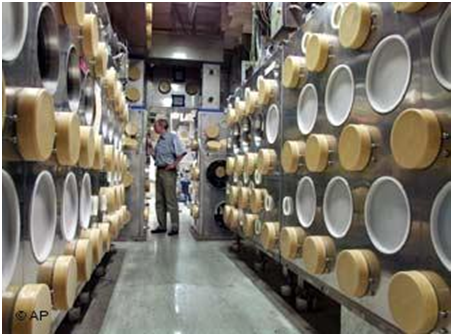Nukem, a private company, operates a facility at Hanau on the River Kinzig in central Germany which concentrated uranium ore and filled fuel tubes with the concentrate for nuclear reactors. Nukem is involved in supplying nuclear fuel to reactors in North and South America, Europe and Asia. It has grown into one of the biggest intermediaries in nuclear fuel in the world. Forty tons of waste generated at Hanau was shipped to Sweden by Westinghouse Atom AB for recovery of residual uranium at Ranstad Mineral AB's uranium processing plant.
Vasteras was a Swedish company formed in 1969 as a partnership between ASEA, a private company and the Swedish government. Eventually, Vasteras bought out the state share of the partnership in the early 1980s. It merged with Brown Boveri, another Swedish company to become ABB Atom, part of the worldwide company group known as ABB. In 2000, ABB Atom was sold to Westinghouse and renamed Westinghouse Atom AB.
The Swedish Parliament has passed strict laws prohibiting the importation of nuclear waste into Sweden from other countries. The waste from Hanau was allowed in because it contained what were classified as "useful residues." Following the extraction of the uranium, the remaining waste was dumped into the Risangen municipal dump site near the town of Skovde.
In 2000, tests by the Swedish Radiation Protection Institute (SSI) confirmed that the radiation in the remaining waste deposited in the Risangen dump exceeded what the Swedish government considers a safe level and further dumping of such waste at Risangen was prohibited. SSI investigated whether Westinghouse Atom AB, the transporter of the Hanau waste, had "penal responsibility" for breaking the Radiation Protection Law. SSI decided that that the dumping of the processed waste at Risangen was only a minor breach of the law and did not rise to "penal responsibility. SSI said that there was no danger to the environment or public health.
Westinghouse Atom AB claims that it did not know that the waste exceeded the Swedish limit. This is difficult to believe given the long history of Westinghouse in the global nuclear industry. Apparently Westinghouse did not test the waste that was leaving the reprocessing plant bound for the municipal dump because they certainly have the technical capability. Since the SSI decided that Westinghouse Atom AB was only guilty of a minor infraction that did not rise to "penal responsibility", if there are any future costs or dangers associated with the radioactive contamination of the Risangen dump, they will be born by the citizens of Sweden and especially those in the area of Skovde. Once again, a government agency has given a private company a pass for incompetence at the least and intentional breaking of Swedish law at the worst.
Plutonium tablets stored at Hanau nuclear facility:
